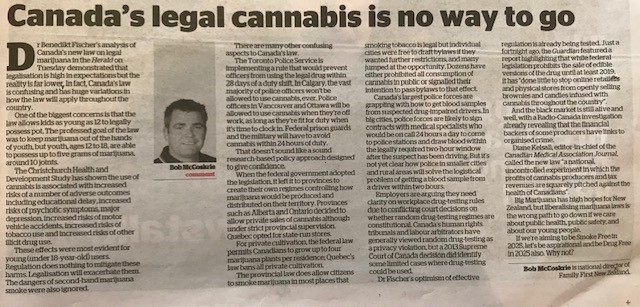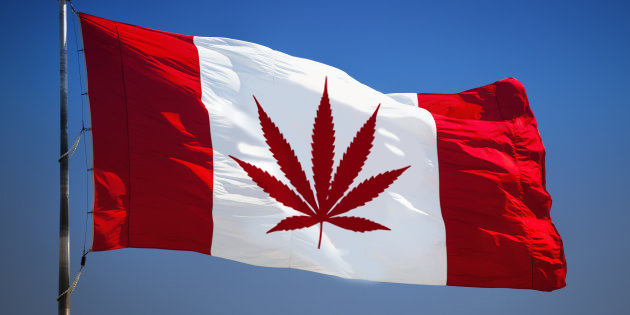 Canada’s law introduced in October 2018 has huge variations of how the law will apply throughout the country.
Canada’s law introduced in October 2018 has huge variations of how the law will apply throughout the country.
JUST RELEASED – DECEMBER 2020
The latest data from Health Canada’s Canadian Cannabis Survey reveals that there has been three years of consecutive increases in use since legalisation, and that almost 1 in 3 Canadian males over 16 consumed cannabis in the past 12 months, and 1 in 4 females.
In 2020, 27% of Canadians reported having used cannabis in the past 12 months, an increase from 25% (2019) and 22% (2018).
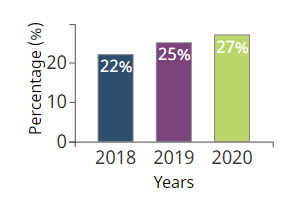 This is growing to almost double the rate in New Zealand, with past year use at just 15% compared to Canada’s 27% under legalisation.
This is growing to almost double the rate in New Zealand, with past year use at just 15% compared to Canada’s 27% under legalisation.
Contrary to claims made by the Drug Foundation, use by teenagers is disturbingly high at 44% (up from 36% just two years ago). In fact, 21% of teenage users were using daily or almost daily. People between the ages of 16 to 24 years reported cannabis use in the past year at a percentage that was approximately double that of those 25 years and older.
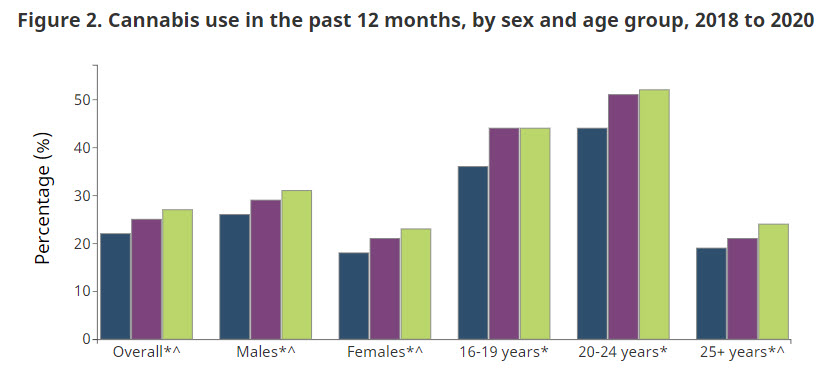 Prevalence of use by users was also high. 47% of past-year cannabis users used at least weekly, with 25% using daily or almost daily.
Prevalence of use by users was also high. 47% of past-year cannabis users used at least weekly, with 25% using daily or almost daily.
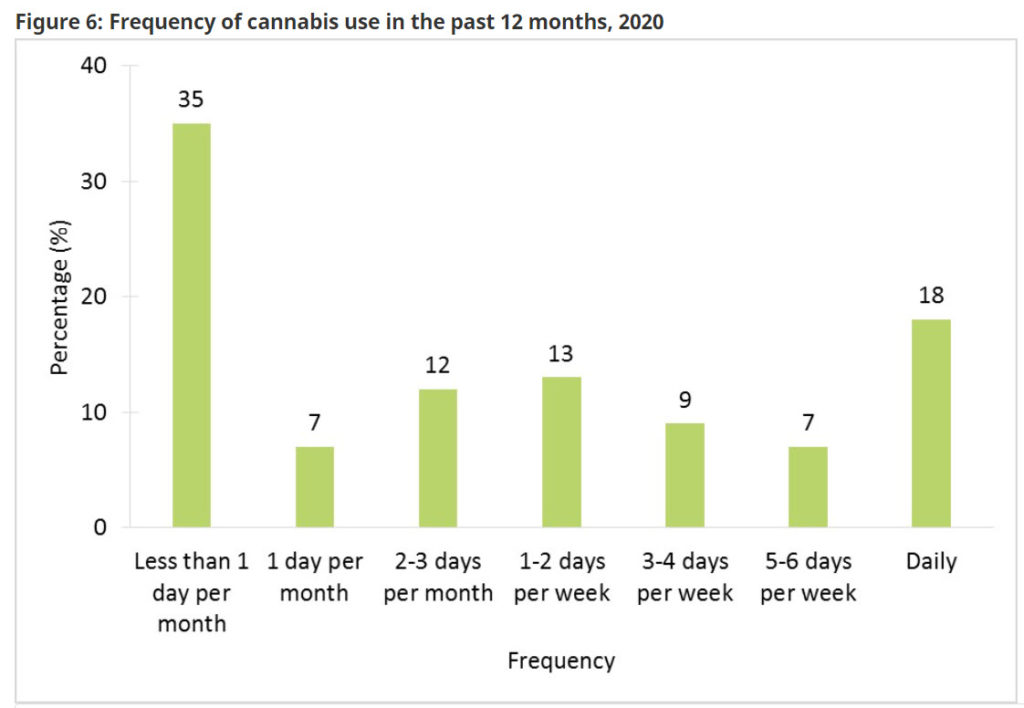
21% of teen users and 23% of young adult users were using daily or almost daily.
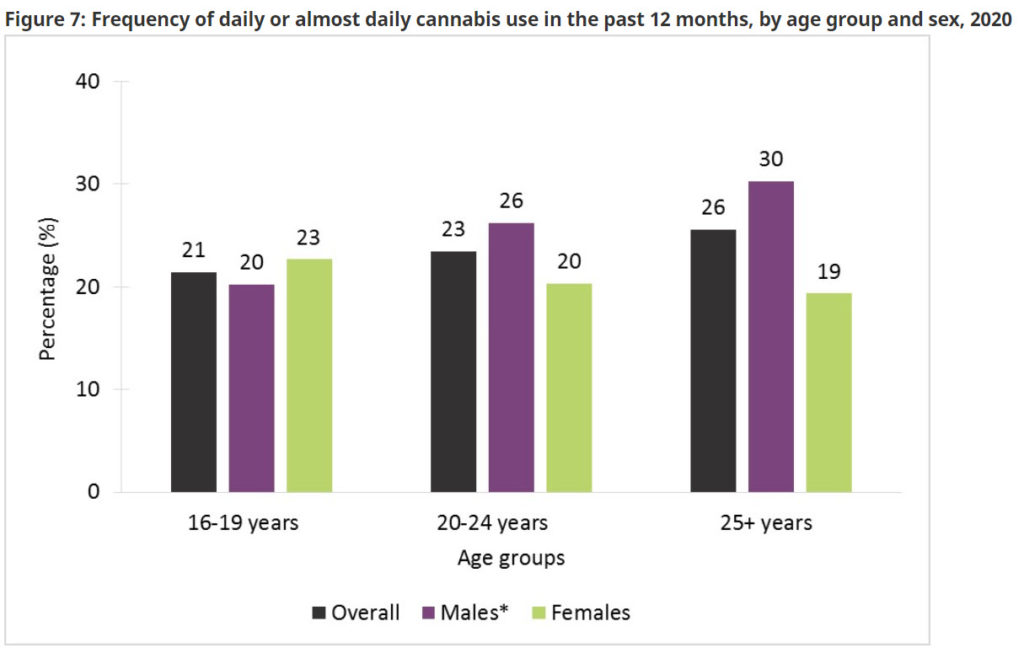
For self-reported mental health, the percentage reporting past 12-month cannabis use increases as mental health ratings decrease. For physical health, the group with the highest proportion reporting past 12-month cannabis use was those who report only fair physical health (31%). The groups with the lowest proportions reporting cannabis use were those reporting excellent (25%) and very good (26%) physical health.
People who had reported using cannabis in the past 30 days were asked about the number of hours they would spend “stoned” or “high” on a typical use day. 36% reported they would be “stoned” or “high” on a typical use day for three or four hours (an increase from 30% in 2019).
Smoking remains the most common method of consuming cannabis, but it has declined while eating cannabis products (edibles) has increased since 2019.
Although 41% reported they had made a purchase from a legal storefront (significantly higher than in 2019 when it was 24%), they also reported spending approximately $49 in the past 30 days to obtain cannabis from legal sources, and $47 from illegal sources.
NOVEMBER 2019
Canada is awash with excess dope. Cannabis inventories came to almost 400 tonnes at the end of August, enough to cover two-and-a-half years of demand. Meanwhile the price of the drug has slumped as legal and illegal cannabis distributors grapple for market share. The stockpile suggests that one year after Canada became the first large economy to allow nationwide recreational use of cannabis, the industry has overestimated how much the country’s pot-smokers can burn through — and underestimated the illegal market’s ability to respond to competition. Canada’s UCP (Alberta) budget projects that cannabis income will remain negative over the next four years, despite previous estimates it would make the province money by 2020. After a year of legalisation, it appears the black market cannabis industry is still thriving since it isn’t subject to legal sector demands.
MAY 2019
A Canadian government study is showing disturbing trends already as a result of legalising marijuana, including increases in youth and overall use, and concerning trends in marijuana-impaired driving and workplace use. The Canadian federal study found approximately 646,000 Canadians have reported trying marijuana for the first time in the last three months, an amount almost double the 327,000 that admitted to trying the drug for the same time period last year.
Past 12-month use Stats Canada
Past 12-month use of cannabis among people aged 16 to 19 years was 44% (increase from 36% in 2018), and those aged 20 to 24 was 51%, (increase from 44% in 2018)
Past 3 months use Stats Canada
A significant decrease in the 15-17 age bracket (19.8% – 10.4%), but an increase in the 18-24 age bracket (30.9% – 33.3%). Any commentary that all teens have decreased their use is clearly wrong!
Other concerning trends include:
- 15% of marijuana users got behind the wheel of a car within two hours of using the drug.
- daily users were more than twice as likely to believe that it was safe for them to operate a vehicle within three hours of ingesting the drug.
- 20% of Canadians who reported driving under the influence of marijuana admitted to also consuming alcohol at the same time.
- about 13%, or half a million, of Canadian workers who are active marijuana users admitted to using the drug either prior to or during work.
This report comes on the heels of government data finding that the black market in Canada is absolutely thriving, with 54% of marijuana sales in the first quarter of 2020 occurring outside the legal market. Statistics Canada, a state agency, reports that just 29% of cannabis users buy all of their product from a legal source.
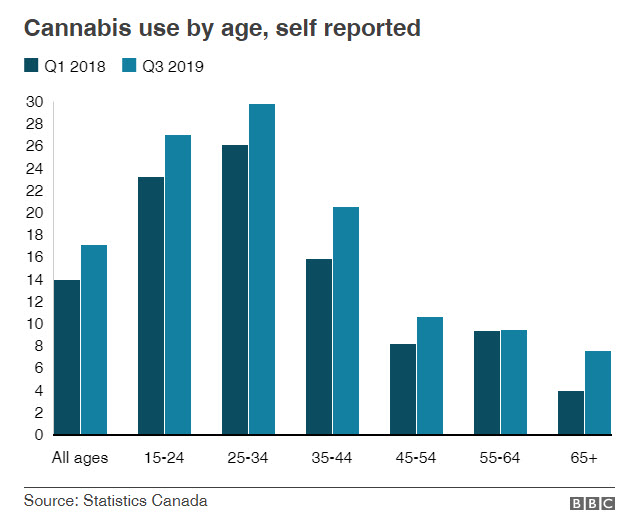
YOUTH
Concern is growing about a little-known provision wrapped into the bill that would allow kids as young as 12 to legally possess pot. The professed goal of the federal Liberals’ Bill C-45 is to keep marijuana out of the hands of youth, but tucked into the bill, among the pages of legislation, is a clause stating youth, ages 12 to 18, will be able to possess up to five grams of marijuana before facing criminal charges (10-15 joints!).
RETAILERS
When the federal government adopted legislation to legalize cannabis last June, it left it to provinces to create their own regimes controlling how marijuana would be produced and distributed on their territory. Provinces such as Alberta and Ontario decided to allow private sales of cannabis — although under strict provincial supervision. Quebec opted for state-run stores.
PRIVATE CULTIVATION
The federal law permits Canadians to grow up to four marijuana plants per residence; Quebec’s law bans all private cultivation.
PUBLIC USE
The provincial law does allow citizens to smoke marijuana in most places that smoking tobacco is legal. But individual cities were free to draft bylaws if they wanted to add further restrictions, and many jumped at the opportunity. Quebec City, Sherbrooke, Levis, Saguenay, Magog, St-Jerome, Victoriaville and dozens of others have either prohibited all consumption of cannabis in public or signalled their intention to pass bylaws to that effect. Montreal, however, announced Wednesday it would not add additional barriers to consuming cannabis.
RENTAL PROPERTIES
Mayor Valerie Plante said most Montrealers are renters, and if their landlords ban cannabis in their units, there won’t be anywhere that citizens can consume what will be a legal product.
DRUG DRIVING
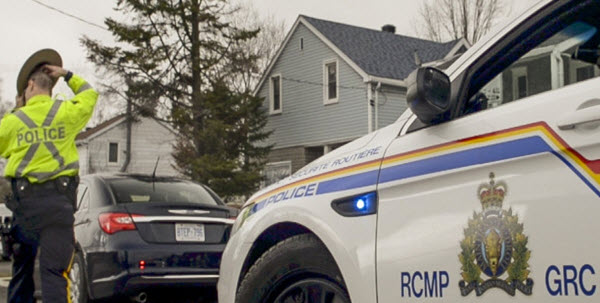 Canada’s largest police forces are grappling with how to reliably — and quickly — get blood samples from suspected drug-impaired drivers. Under the new law, police can demand a blood sample once they have reasonable grounds to believe a person is impaired, such as a failed field sobriety test or a positive result on a saliva-testing device. In big cities, police forces are likely to sign contracts with medical specialists who would be on call 24 hours a day to come to police stations and draw blood within the legally required two-hour window after the suspect has been driving. But it’s not yet clear how police in smaller cities and rural areas will solve the logistical problem of getting a blood sample from a driver within two hours.
Canada’s largest police forces are grappling with how to reliably — and quickly — get blood samples from suspected drug-impaired drivers. Under the new law, police can demand a blood sample once they have reasonable grounds to believe a person is impaired, such as a failed field sobriety test or a positive result on a saliva-testing device. In big cities, police forces are likely to sign contracts with medical specialists who would be on call 24 hours a day to come to police stations and draw blood within the legally required two-hour window after the suspect has been driving. But it’s not yet clear how police in smaller cities and rural areas will solve the logistical problem of getting a blood sample from a driver within two hours.
A quarter of Canadians aged 18 to 34 have driven after consuming cannabis or been a passenger in a vehicle driven by someone under the influence of cannabis, in a new survey released in December (2019) by the Canadian Automobile Association (CAA). 86% of young Canadians said it is important to find alternative ways to get home when they drink alcohol, but only 70% of them believe it is important to do so after using cannabis.
WORKPLACE DRUG-TESTING RULES
Employers are arguing they need clarity on workplace drug-testing rules due to conflicting court decisions on whether random drug-testing regimes are constitutional. Canada’s human rights tribunals and labour arbitrators have generally viewed random drug-testing as a privacy violation, though a 2013 Supreme Court of Canada decision did identify some limited cases where drug-testing could be used. “There’s confusion in this space over what the rules are, what is allowed, what is not allowed, how is it to be done,” said Derrick Hynes, executive director of Federally Regulated Employers — Transportation and Communications.
FIT FOR POLICE DUTY?
The Toronto Police Service is implementing a rule that would prevent officers from using the soon-to-be-legal drug within 28 days of a duty shift. In Calgary, the vast majority of police officers won’t be allowed to use cannabis, ever. Police officers in Vancouver and Ottawa will be allowed to use cannabis when they’re off work, as long as they’re fit for duty when it’s time to clock in. Federal prison guards and some other correctional staff, meanwhile, will have to avoid cannabis within 24 hours of duty.
What the legal cannabis market will look like across Canada (in each province and territory)
(note the inconsistency around personal growing, public smoking, retail stores)
Diane Kelsall, editor in chief of the Canadian Medical Association Journal, called the October 17 launch:
“a national, uncontrolled experiment in which the profits of cannabis producers and tax revenues are squarely pitched against the health of Canadians.“
HEALTH MINISTRY ADVICE
Ironically, the Canadian government legalised a drug for non-medical purposes – despite their health watch-dog making the following statement –
When the product should not be used
Cannabis should not be used if you:
- are under the age of 25
- are allergic to any cannabinoid or to smoke
- have serious liver, kidney, heart or lung disease
- have a personal or family history of serious mental disorders such as schizophrenia, psychosis, depression, or bipolar disorder
- are pregnant, are planning to get pregnant, or are breast-feeding
- are a man who wishes to start a family
- have a history of alcohol or drug abuse or substance dependence
READ Bob McCoskrie: Canada’s legal cannabis is no way to go – NZ Herald 29 Nov 2018
